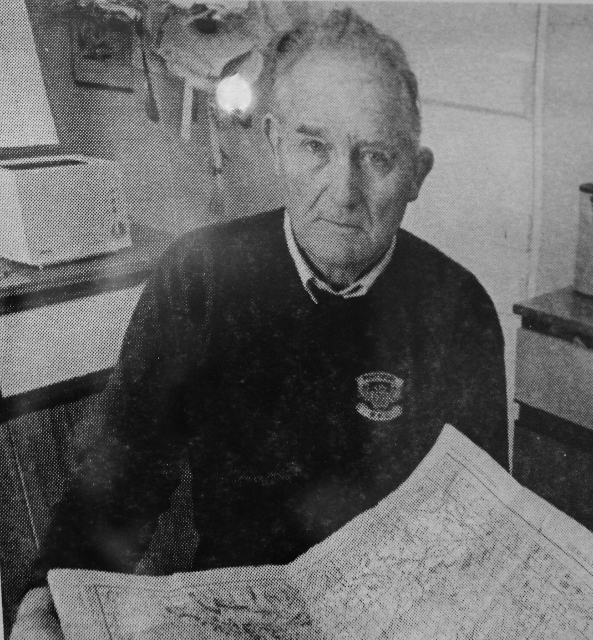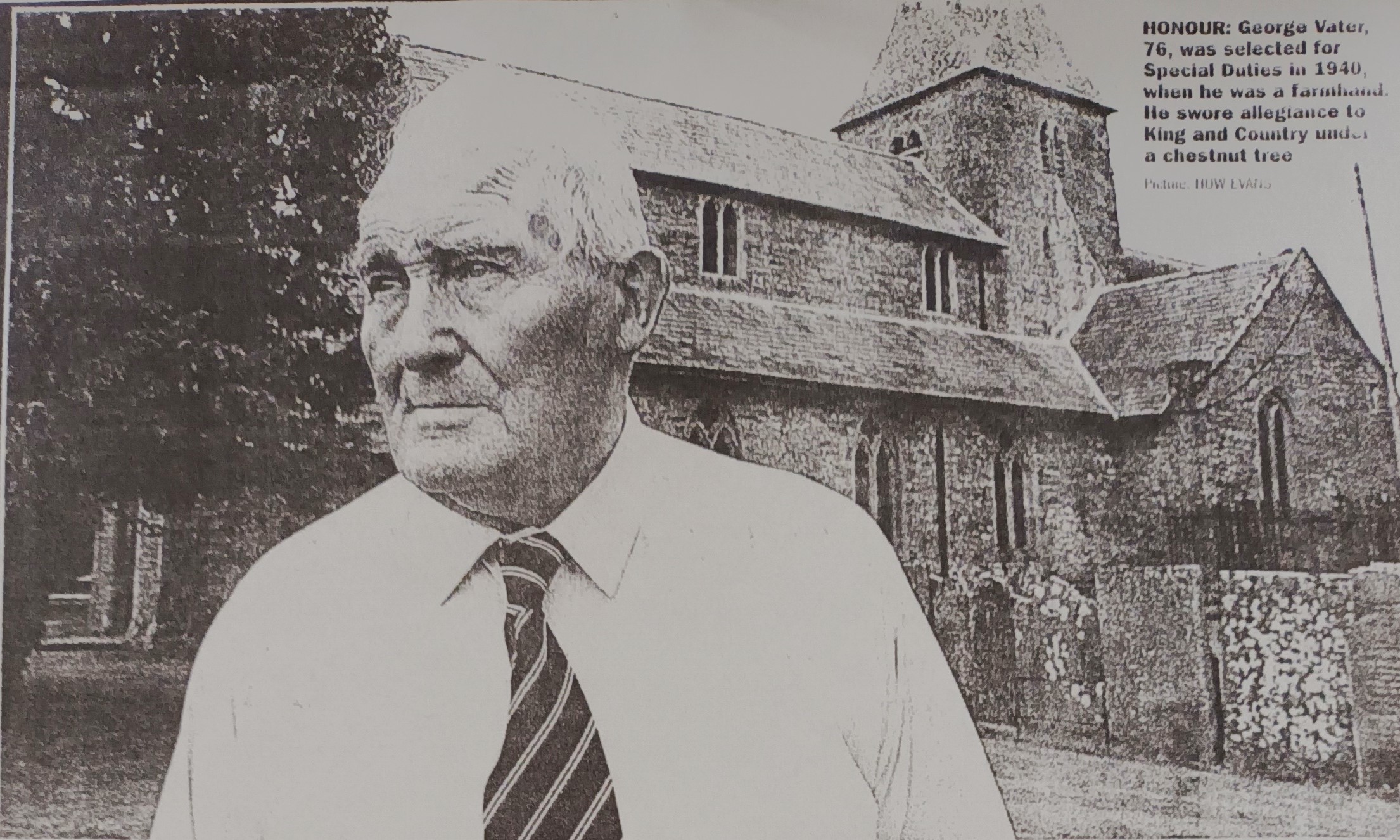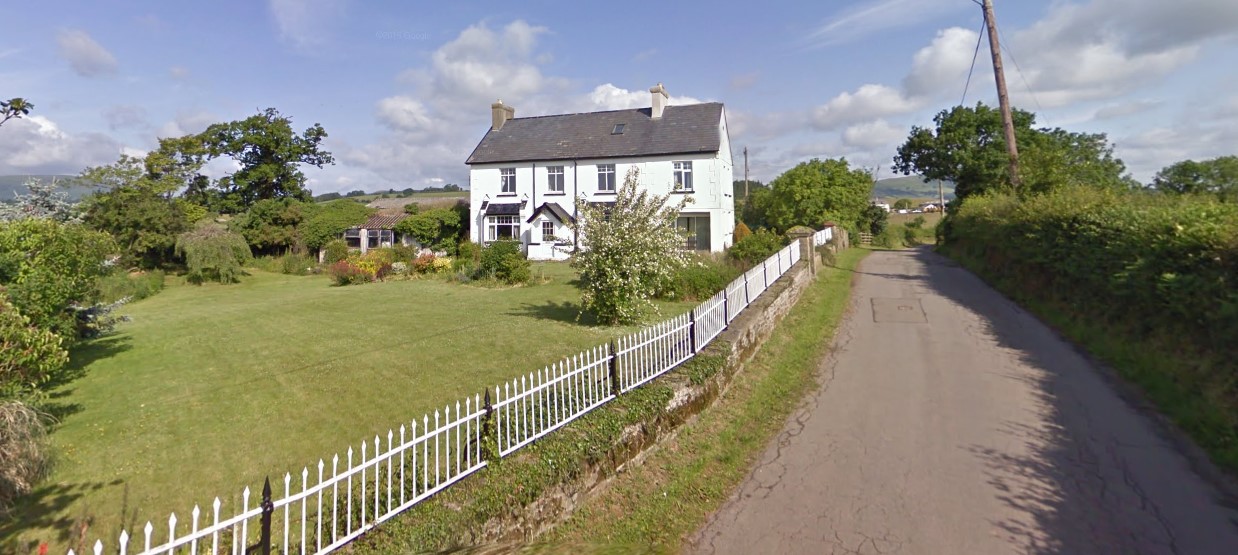In 2006 George spoke to the BBC 'WW2 People's War' which is an online archive of wartime memories contributed by members of the public and gathered by the BBC.
When the war started I was at Court Morgan I was a farmer’s son, working on the land….or at least when the war started I was in King Henry Grammar School. Originally the war made no difference to me, but when I was enlisted into the Secret Army I did quite a lot of work for Military Intelligence.
I went to Newport to join the Army, I had a medical, and an IQ test, and after the medical was over about five or six of us were told to remain in our places and were then interviewed by a Colonel Hughes and I was told that in a few days time someone would come and visit me. I thought it was a funny sort of undertaking for the army, but anyway, sometime during the following week this chappie arrived who said he was Tommy Atkins, and gave me the third degree on my interview with the Colonel and said they had a special job for me to do and I had to swear to the oath of allegiance and then swear on the official secrets act and was told from that moment on my name was never to be written down and everything I did was to be done secretly and nothing was to be done in writing. I was taken aback a little, but in those days you didn’t bother to think everybody was dying and people were being killed everywhere so you just obeyed orders and got on with it. First of all he produced a large number of documents which were marked Top Secret and told me to learn all that was on them. And what was on them was the insignias and colours of the German armoured forces which were stationed on the other side of the Channel all the way from the Hook of Holland all the way down to Cap Greenay and I had to learn them all off by heart and the following week he came along and tested me on what I’d learned, what I knew. He said that’s alright and he gave me a lump of edible paper on which messages were to be written and I did try some, I tried to eat it, because if you were caught with the paper that was the idea you had to eat the messages. It was a bit like chewing gum, pretty poor standard, gooey and not a very nice flavour. So then after that I was introduced to the other people who were going to work in this secret unit. One was the vicar of Llanddewi, the Rev. Vincent Evans, Gower Rees the vicar of Llanarth, John Evans, a farm worker, somebody Steele who was a gardener….there were about eight of us. We had the first meeting of the vicarage in Llanddewi and the last words that Tommy Atkins told us was “Gentlemen if necessary you all die. You do not break a secret, you die” Which I thought for a 17 year old was not much of a prospect…but there you are!
Our job was to….if there were any units which were foreign, or if their shoulder tabs were unknown to us they were to be reported immediately there was a radio set at Llantilio under the altar in the Church that was operated by the Revd. Sluman and our message had to get to him then he would report these arm flashes to Western Command and if necessary these people would be rounded up. They were all Dutch or Polish if we didn’t know them they were mostly European. Then we were told we had to get into British camps and find out how many tanks, or motor vehicles or soldiers for that matter, were stationed in the area, and that had to be reported back to headquarters.
Had you lived in those days, it was something of a mystery….they had to know what units were in the area, whether they were British or foreign, because they were expecting German paratroopers. In our area they were expecting an invasion up the Bristol Channel from Ireland. So that’s why we were so active — it was every night someone had to be on duty. Eight of us covered about five parishes. We weren’t allowed to walk on roads we had to walk through fields and woods, and when we were active the Auxiliaries were also active in the woods and they were underground in operational bases and they were there every night. Our job was also, if we saw them, to report them. But as far as I know we never saw any of them. We had to report anyone we thought might be a collaborator was reported to Sluman who then radioed it back to the Blorenge mountain, there was a huge radio station underground there…and then back to Western Command in Abergavenny.
I didn’t see any…only prisoners of war, I saw plenty of prisoners of war, Italians and Germans, I saw Hess a couple of times. That was one of our duties Maindiff Court wasn’t that far away and we had to walk the area to make sure there weren’t paratroopers coming down. They did think at one time that they might try a landing to either shoot him or take him away.
And after being out all night on duty, you had to work the next day as normal. Everyone did - all those chaps who were Auxiliaries, they came out of their little hides in the woods and went back to work next morning. Even their families — I mean none of the families knew what you were doing, it was so secret you weren’t allowed to mention it to anyone.
And I met two chappies in 1995 we had a reunion dinner of the auxiliaries and these chaps lived in Llanarth, the next parish. And I said to them, you kept this pretty close that you were members of the Secret Army and they said: “If you told anyone they wouldn’t have believed you!” And that’s how it was.
A poem written by George was given to David, the son of Reverend Vincent Evens by his widow;
SECRET ARMY
They were trained to fight the Germans – counter invasion first of all,
Then, trained to fight in Britain.........should their country fall.
They were trained in night patrolling, trained to wreck, but never riot
The war went on around them, as they trained upon the quiet.
Few folks knew about them then,
Few folks know them now.
Winston Churchill said “You’re hand-picked men.
You are my ‘Secret Army’ so YOU dare not take a bow.”
They were never issued uniform, they were to fight in the clothes they stood.
Their battleground was to be the field, the hedge, the ditch, the wood.
They were trained to fight in Britain, never to fight abroad.
But Hitler’s armies did not land here AND for that they thank the Lord.
| Unit or location | Role | Posted from | until |
|---|---|---|---|
| Is-orsaf Eglwys Llandeilo Gresynni | Runner | Unknown | 20 Jul 1944 |
| Llantilio Crossenny Church Suboutstation | Runner | Unknown | 20 Jul 1944 |
Farmer and bus operator
The son of Augustus and Emily.


